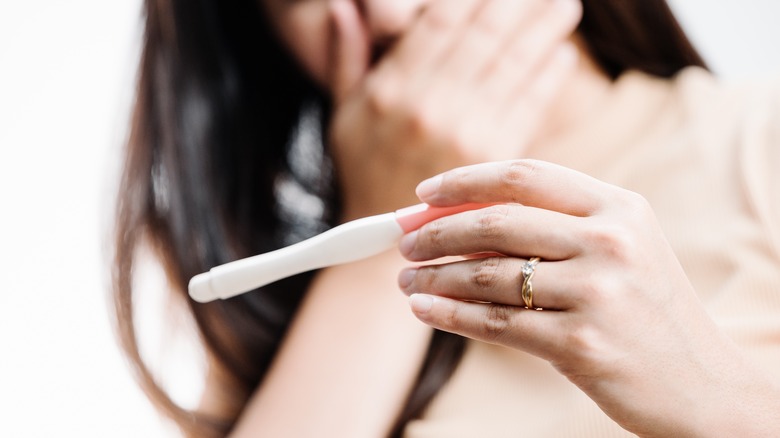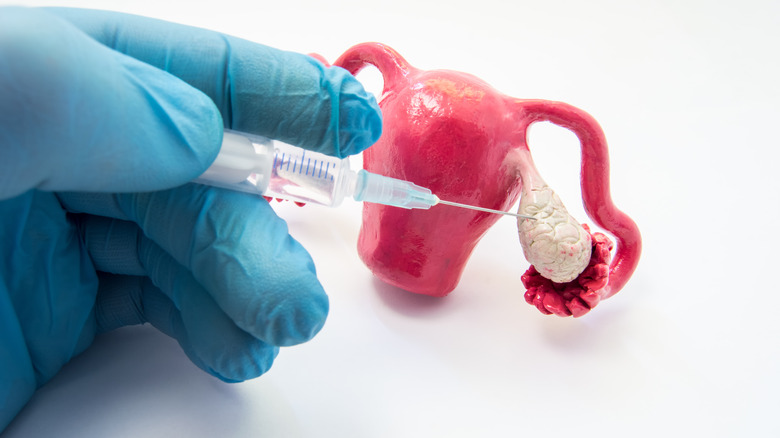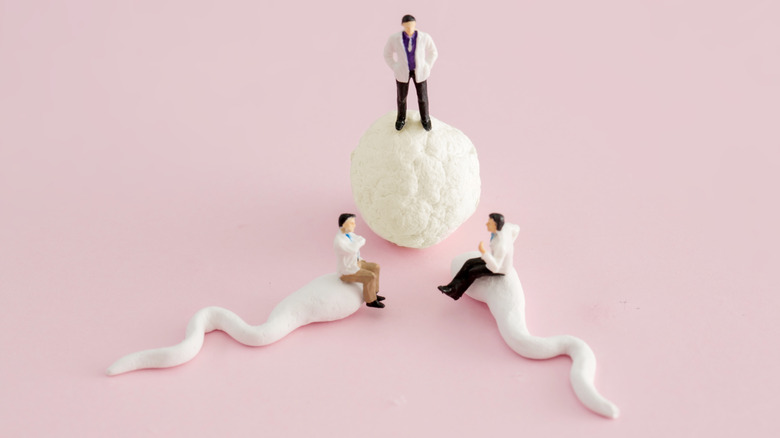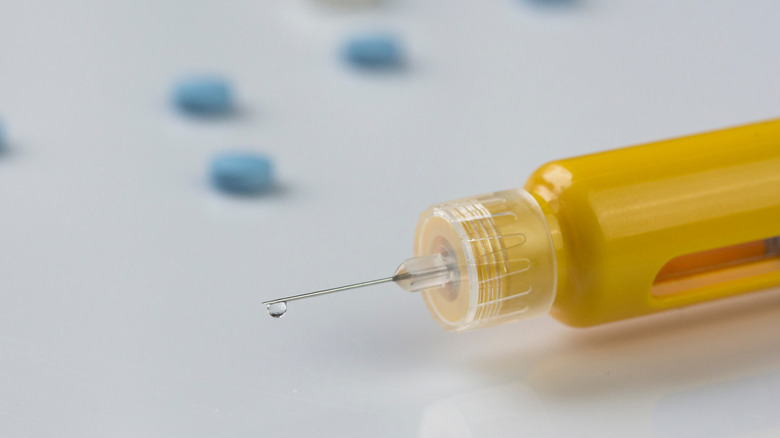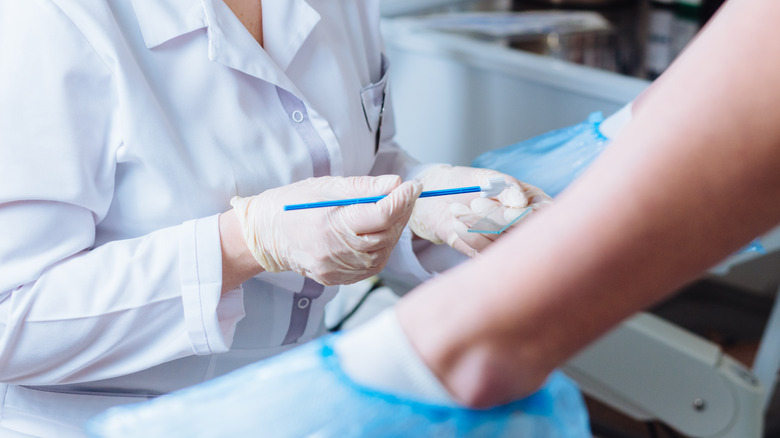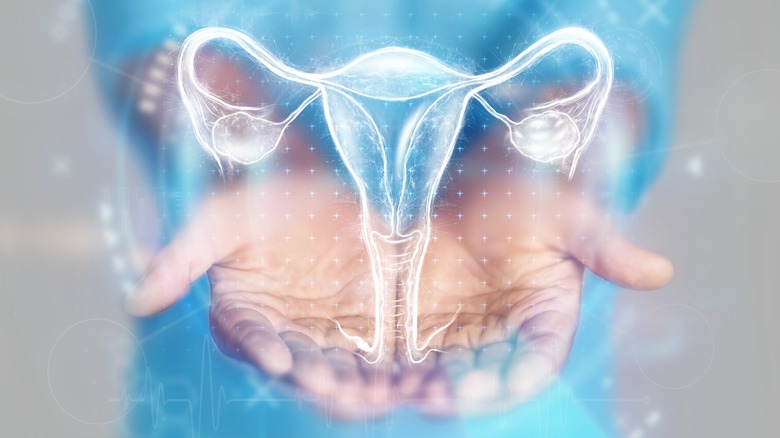What Happens To Your Body When You Have An IUI Procedure
2021 saw over 3.6 million babies born, making it the first time in seven years there was an increase in the number of reported births (per CDC). However, not all were conceived in a traditional manner. The Eunice Kennedy Schriver National Institute of Child Health and Human Development reports that nearly 10% of American men and almost 15% of women had problems becoming pregnant and turned to doctors for assistance.
One type of fertility procedure is intrauterine insemination (IUI). Over one-quarter of IUI procedures were successful, and around 90% of those who had an IUI got pregnant within three tries (via Cofertility). However, according to Healthline, the outcome depends on age and why you chose to use this method to conceive. Those over 40 and those with specific infertility issues stand less of a chance of success.
Undergoing an IUI allows sperm to bypass the cervix and get placed directly in the uterus and closer to the egg it needs to fertilize. The sperm can come from a donor or a partner, and not only helps those having trouble conceiving, but also enables same-sex couples and single women to get pregnant.
Ovarian stimulation
During a typical menstrual cycle, around day 7, the hormone FSH (which is responsible for ovarian follicle growth) reaches its peak (per Eureka Fertility). Then, on day 14, one ovarian follicle reaches full development and releases an egg into the fallopian tube, where it's fertilized with sperm.
For those undergoing IUI, the first step is often ovarian stimulation, which Human Reproduction Open defines as the use of medication to activate ovarian follicle development to assist with timed insemination and increase the number of eggs released for possible fertilization (as more eggs offer more chances of becoming pregnant).
Before beginning ovarian stimulation, the medical professionals at Northwestern Medicine Center for Fertility & Reproductive Medicine say that you'll have to undergo an ultrasound and blood work. Starting on day four, you will begin to be monitored through blood tests and ultrasounds to determine whey you are ready to have the procedure based on the size of the follicles your body generates and your estrogen levels. These tests will occur up to seven times over about two weeks. Duration depends on how well you respond to the medication and how well your follicles grow (via Eureka Fertility).
Unmedicated IUI
Unassisted conception occurs when sperm navigate from the vagina to the fallopian tubes by way of the cervix and uterus (via the American Society for Reproductive Medicine). Your cervix limits the number of sperm that can successfully make the trip, and fertilization only occurs if the sperm arrives around the time your ovary releases an egg. An IUI procedure allows sperm to circumvent the cervix, offering a better chance at pregnancy.
For women that have consistently regular cycles and ovulate between days 12 and 16, an unmedicated IUI without medication for ovarian stimulation is an option. The medical professionals at Texas Fertility Center say that your fallopian tubes must be open to facilitate the meeting of the egg and sperm. According to the doctors at Fertility Plus, an unmedicated IUI procedure starts by having you undergo a scan around day nine of your cycle. From there, you use a urine ovulation predictor kit to measure how much luteinizing hormone (LH) your body releases in your urine (per Texas Fertility Center). LH surges when you're about to ovulate. At that point, you are ready for sperm implantation (per Fertility Plus).
Texas Fertility Center reports that unmedicated IUIs procure a pregnancy rate between 6% and 10% per cycle. Fertility Plus attributes the low success rate to patients missing ovulation.
Clomid IUI
Per the medical professionals at Tree of Life Center, the fertility drug Clomid coaxes your ovaries into producing more than one egg each cycle that it's used. Clomid works by increasing your follicle stimulating hormone (FSH) levels. While primarily used to restore ovulation in women with polycystic ovarian syndrome (PCOS), Clomid makes IUI more effective. In fact, research published by the New England Journal of Medicine show that almost 30% of the women who used the drug got pregnant.
When undergoing a Clomid IUI, you will have blood work done and begin taking the medication on day three of your cycle. Doctors will monitor the drug's effectiveness through a transvaginal ultrasound (per Progyny). Then, either the day you ovulate or the next day, the sperm will be prepared and placed in your uterus.
In addition to increasing your pregnancy odds, Healthline reports using Clomid is one of the most economical, as it can be prescribed by your regular doctor or OB-GYN and is an oral medication that doesn't require injections. Few reported side effects by those who use Clomid, and most are mild. However, it can take a few tries to find the correct dosage, and depending on your doctor will only be used for six to 12 cycles before recommending another method.
Combination IUI
After six unsuccessful cycles, most doctors recommend moving on from Clomid and using other medications (via NEJM Journal Watch). Many reproduction specialists, including those at The Fertility Center of Oregon, turn to human menopausal gonadotropins (HMG), including Humegon, Pergonal, and Repronex. These drugs contain a combination of follicle-stimulating hormone (FSH) and luteinizing hormones (LH). Also produced in your pituitary gland, daily injections of FSH and LH trigger your ovaries to make eggs.
According to Winfertility, the process of taking these medications begins on day three of your cycle, when you undergo an ultrasound and blood work. You then inject yourself for six to 10 days. Your doctor will monitor egg growth and development through additional blood work and ultrasounds. Once the egg grows to the appropriate size, your doctor will then instruct you to inject the ovulation drug human chorionic gonadotropin (HCG). Your doctor will perform your IUI within 48 hours.
The Fertility Center of Oregon reports that nearly 90% of those treated with FSH and LH ovulate, and up to 80% end up pregnant. However, roughly one-quarter of those pregnancy end in spontaneous miscarriages. Moreover, Winfertility also reminds patients that success decreases as you age, and the additional medications and monitoring add to the costs associated with IUI. Finally, these drugs increase your chances of carrying more than one child.
Cycle monitoring
When undergoing a fertility treatment like IUI, the first step is often ovulation cycle monitoring (per Northwell Health). Per doctors at TRIO Fertility, cycle monitoring can determine the best course of action to help you get pregnant by monitoring how your follicles grow and how your uterine line thickens. To do this, doctors will have you undergo several blood tests and ultrasounds (via Northwell Health). The amount of testing you sustain depends on how long your cycle runs. You will have to return around the seven-day mark to undergo monitoring every few days until you ovulate, according to the medical professionals at The Portland Hospital. At that point, you will then have to see the doctor daily.
The Cleveland Clinic explains that one of the things you get tested for is LH levels, because the amount of LH in your system naturally increases when you ovulate. When this occurs, if you have been prescribed HCG, doctors will instruct you on when to administer the shot (via TRIO Fertility). Your IUI gets scheduled for the day after LH detection or your hCG injection.
Cycle monitoring also enables doctors to ensure the medication doesn't overstimulate your ovaries, which increases your risk of becoming pregnant with more than one child (via Northwell Health).
The IUI procedure
According to inviTRA, if you intend to use your partner's sperm, he must abstain from sex for at least three days before the procedure and obtain a sample via masturbation on the day of your IUI procedure. If you are using donor sperm, it must have been acquired and frozen for at least six months. Before the procedure, the sperm collected must go through a process known as capacitation to remove seminal plasma and any sperm that isn't viable to improve your chances of getting pregnant.
When it's time for the IUI, your doctor will attach the vial of sperm to a catheter, and you will get into the same position you do when undergoing a Pap spear (via USF Health IVF and Reproductive Endocrinology). The catheter goes through your cervix into your uterus. The sperm gets pushed through the catheter, and then the doctor takes the catheter out. Once the catheter is removed, you will lay back for a bit and then get dressed and resume your normal activities (via Mayo Clinic).
The entire process shouldn't take longer than 20 minutes, with the actual IUI only lasting a minute or so. IUI procedures are done in a doctor's office and don't require drugs.
What happens after IUI
While not a cause for concern, you may notice slight spotting after your IUI (per USF Health IVF and Reproductive Endocrinology). The medical professionals at Obstetrics and Gynecology of Atlanta also warn that cramping could occur, which over-the-counter pain relievers like Tylenol can alleviate. You may resume all regular activities, including having sex, as this can further improve your odds of getting pregnant. However, if you experience severe cramping, fever, or abnormal vaginal discharge, the medical professionals at USF Health IVF and Reproductive Endocrinology recommend calling your doctor.
According to The New York Times, you will undergo a blood test a week after the procedure to ensure that you ovulated as expected. Then, two weeks later, your doctor will either ask you to take a home pregnancy test and call them with the results or have you in for more blood work to see if the IUI was successful. However, USF Health IVF and Reproductive Endocrinology warn that taking a test prior to 14 days after your procedure may cause a false positive due to the medications taken for the IUI.
Possible side effects of IUI
The IUI procedure causes some women to experience cramping (via USF Health IVF and Reproductive Endocrinology). The pain results from the catheter irritating the cervix or the uterus. Additionally, medically enhancing the ovulation process can cause some women to cramp. Regardless of the cause, the pain should subside quickly.
Some patients (via Advanced Fertility Care) may also feel some pinching during the procedure from the speculum used. This feeling subsides when the IUI is complete. However, if you are easily susceptible to uterine infections, you should expect more pain than someone who doesn't get them. Additionally, most women who have undergone more than one IUI report that the discomfort decreases with each procedure.
Apollo Fertility reports that the medications prescribed to improve your chances of pregnancy often result in women experiencing pain at the injection site, as well as hot flashes, mood swings, and depression. Other side effects include feeling queasy, headaches, and discomfort due to swollen ovaries. Additionally, the drugs prescribed can cause your breasts to ache and result in your body producing ovarian cysts.
IUI versus IVF
Though both are considered fertility treatments, in vitro fertilization (IVF), a process where your doctor removes your eggs and fertilizes them externally, has several steps that aren't part of IUI (per Northwestern Medicine). Additionally, the experts at Cleveland Clinic recommend IVF only after you've undergone at least three unsuccessful IUI procedures. IVF may be recommended sooner if your partner has severe infertility, your fallopian tubes are blocked, you've been diagnosed with endometriosis, or you have had miscarriages.
When you undergo IVF, you take a much higher dose of injectable hormones than prescribed for IUI. These medications help you produce at least 10 follicles. Then, you undergo oocyte retrieval to have the eggs removed and taken to a lab to be fertilized and either implanted into your uterus or frozen for use at a later date.
Though more expensive and invasive than IUI, Mindy Christianson, M.D. and medical director at Johns Hopkins Fertility Center in Baltimore, told Forbes Media that IVF makes it so that "embryos can also be tested ahead of time for health such as chromosomes as well as genetic disorders." Additionally, IVF tends to be more successful than IUI.
Intracervical insemination (ICI)
Another type of fertility treatment available is intracervical insemination (ICI). Though similar to IUI, ICI includes differences in sperm treatment and placement in your body. The medical professionals at Carolinas Fertility Institute explain that sperm used for ICI isn't processed before use. Additionally, sperm is placed in your cervix when you undergo an ICI.
Furthermore, when you undergo ICI, your doctor will insert a cervical cap to keep the sperm where they belong in hopes of increasing the amount that makes it to your uterus to fertilize your egg (via Béa Fertility). Similar in design to a menstrual cup, you will wear this device for up to 12 hours.
Some sperm and egg banks, like Cryos International, offer materials for you to complete ICI at home. The sperm you choose gets shipped in nitrogen, along with instructions and the device needed for insertion. While a doctor isn't required for this process, the medical professionals at Cryos International recommend seeing a physician to improve your chances of becoming pregnant. Furthermore, they also state that at-home ICI is not intended for those having trouble conceiving.
ICI tends to be more cost-effective than IUI, with similar success rates (via Béa Fertility).
Intrauterine tuboperitoneal insemination (IUTPI)
If you want to improve your pregnancy odds and you have mild endometriosis (or your partner has mild infertility), the medical professionals at Advanced Fertility Care recommend intrauterine tuboperitoneal insemination (IUTPI). IUTPI resembles IUI in that medications to increase ovulation are used.
Furthermore, the sperm gets treated and implanted approximately a day after you've injected HCG. However, Fertility and Sterility explain that when you undergo an IUTPI, the speculum stays in for a few minutes after the procedure is complete. At that point, your doctor may repeat the process if a substantial amount of semen remains in the syringe.
Another difference those involved in a study published by Neogenesis point out is that when you have an IUTPI, more than double the amount of sperm is used. Only 4 milliliters is used for an IUI, while 10 milliliters gets used for IUTPI. This increase in sperm intensifies the pressure in your uterus, allowing your uterus to fill. The increased pressure allows sperm to get around any blockages and have more success reaching and fertilizing the egg.
According to a study published in the International Journal of Research in Medical Sciences, IUTPI is almost twice as effective as IUI in producing pregnancies.
Intratubal insemination (ITI)
Also referred to as fallopian tube sperm perfusion (FSP), intratubal insemination (ITI) is another type of fertility treatment. For this procedure, the physicians at Advanced Fertility Care explain that the sperm gets placed in your fallopian tubes. According to Medic8, this placement allows the sperm to avoid the cervix during travels to fertilize the egg.
Like a traditional IUI, the sperm is cleaned beforehand and placed in a syringe. Then, your physician makes an incision and inserts a tiny camera into your pelvis to properly monitor the procedure. A catheter then gets inserted with one end in one of your fallopian tubes and the other attached to the syringe. Finally, the sperm gets pushed out of the syringe, up the catheter, and into your fallopian tube.
A study published by the International Journal of Fertility and Sterility found little difference in pregnancy rates when comparing IUI and ITI. Furthermore, according to Medic8, ITI isn't recommended for women with endometriosis, damaged or blocked fallopian tubes, or untreated ovulation issues. ITI is also not a good choice if your partner has a low sperm count.
Risks of IUI
As with any medical procedure, some risk is involved when you undergo an IUI. However, Healthline reports that the chance of infection is rare because doctors use sterile equipment. In fact, in a study referenced by FertilityIQ, less than 50 infections occurred in nearly 20 years and close to 50,000 procedures. Infection-causing germs come from the catheter, acquiring and moving bacteria as it gets threaded through the vagina. Additionally, contaminated sperm can also cause infections to occur.
According to Healthline, your body can react to the medications used to increase the number of eggs you produce, resulting in ovarian hyperstimulation syndrome. If this occurs, not only will you have an abundance of eggs, your ovaries could enlarge and your abdomen could fill with fluid, causing cramping. Monitoring through blood work and ultrasounds helps your doctor find the right amount of medication to prevent this from occurring.
Additionally, because these medications cause you to release more than one egg, you risk being pregnant with more than one child (via Healthline). FertilityIQ states that multiple gestations occur with nearly 15% of those who take Clomid, and close to one-third of those administered gonadotropin have more than one child at a time.
Regardless of how you conceive your child, either through IUI or naturally, congenital disability statistics remain between 2% and 4% (per the American Society for Reproductive Medicine).
Doctors who perform IUI
Fertility specialists treat all issues pertaining to getting pregnant, even if there isn't one. Known as unexplained infertility, the inability to conceive without apparent reason affects nearly 30% of those who have difficulty getting pregnant (via Penn Medicine Lancaster General Health). In addition to IUI, these doctors offer options to help you find the best way to have a child.
Also referred to as a reproductive endocrinologist, a fertility specialist is a doctor who completed medical school, a four-year residency program in obstetrics and gynecology, and then went on to do a three-year fellowship in reproductive endocrinology. Additionally, these doctors must also acquire board certification through oral and written exams. Unlike a traditional OB/GYN, a reproductive endocrinologist treats both women and men (per University OB/GYN Associates).
Penn Medicine recommends starting with your OB/GYN. However, they may send you to a fertility specialist if you have irregular periods, have had a miscarriage or an STD, or are over 30. Additionally, your partner may be sent to a urologist if he has had an STD, low sperm count, or abnormal sperm analysis.
According to the National Health Service (NHS), most couples who have regular unprotected sex get pregnant within a year; if you have yet to conceive after twelve months, see a doctor. However, if you or your partner have a preexisting health condition, you may not want to wait that long (via Cleveland Clinic).

